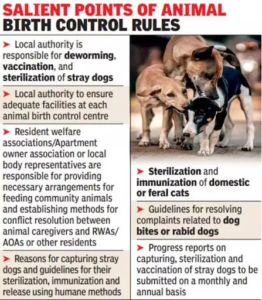In news– The Central Government has notified the Animal Birth Control Rules, 2023 vide G.S.R 193(E) dated 10th March, 2023 under Prevention of Cruelty to Animal Act, 1960 and after superseding the Animal Birth Control (Dog) Rules, 2001.
Key rules-
- They purportedly respond to three stimuli: strays cannot be relocated, as the Supreme Court of India has held; must not face cruelty; and must be cared for.
- The 2023 Rules require strays to be caught, vaccinated, neutered, and released back.
- The 2023 Rules also ask residents’ welfare associations to care for stray dogs and feed them away from the children and the elderly, at fixed intervals. This could further the dogs’ homelessness, and thus susceptibility to disease, injury, and discomfort.
- In the process, the Rules also transform “stray dogs” into a new class of “community animals”.
- The 2023 Rules, superseding the ABC (Dog) Rules, 2001, say that the birth control programmes for sterilisation and immunisation of stray dogs are to be carried out by the respective local bodies/ municipalities/ municipal corporations and panchayats.
- The Municipal Corporations need to implement the ABC and Anti Rabies Program jointly.
- The Rules also provides the guidelines how to deal with the human and stray dog conflicts without relocating the dogs in an area.
- One of the requirements under the Rule is that the Animal Birth Control Programme needs to be carried out by the Animal Welfare Board of India(AWBI) recognized organization specifically recognised for Animal Birth Control programme.

Note:
- According to the World Health Organization, 36% of the world’s and 65% of Southeast Asia’s rabies deaths happen in India.
- The National Rabies Control Programme has recorded 6,644 clinically suspected cases and deaths of human rabies in 2012-22.
- The Animal Birth Control Rules 2001 laid down the law for the only viable dog population management mechanism but its implementation was scanty and monitoring was altogether absent over two decades.
















